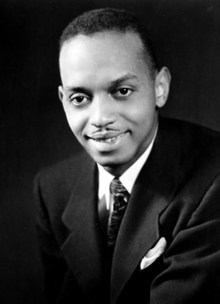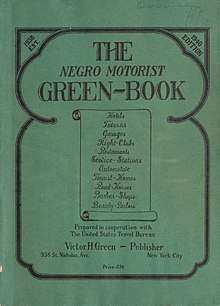Don Shirley
Donald Walbridge Shirley (January 29, 1927 – April 6, 2013) was an American classical and jazz pianist and composer. He recorded many albums for Cadence Records during the 1950s and 1960s, experimenting with jazz with a classical influence. He wrote organ symphonies, piano concerti, a cello concerto, three string quartets, a one-act opera, works for organ, piano and violin, a symphonic tone poem based on the 1939 novel Finnegans Wake by James Joyce, and a set of "Variations" on the 1858 opera Orpheus in the Underworld.[1]
Don Shirley | |
|---|---|
 | |
| Born | Donald Walbridge Shirley January 29, 1927 Pensacola, Florida, U.S. |
| Died | April 6, 2013 (aged 86) Manhattan, New York, U.S. |
| Alma mater | The Catholic University of America University of Chicago Leningrad Conservatory of Music |
| Occupation |
|
| Spouse(s) | Jean C. Hill
( m. 1952, divorced) |
| Musical career | |
| Genres | |
| Instruments |
|
| Years active | 1945–2013 |
| Labels | |
Born in Pensacola, Florida, Shirley was a promising young student of classical piano. Although he did not achieve recognition in his early career playing traditional classical music, he found success with his blending of various musical traditions.
During the 1960s, Shirley went on a number of concert tours, some in Deep South states. For a time, he hired New York nightclub bouncer Tony "Lip" Vallelonga as his driver and bodyguard. Their story was dramatized in the 2018 film Green Book, in which he was played by Mahershala Ali.[2][3]
Biography
Early life
Donald Walbridge Shirley was born on January 29, 1927, in Pensacola, Florida,[4] to Jamaican immigrants, Stella Gertrude (1903–1936), a teacher, and Edwin S. Shirley (1885–1982), an Episcopal priest.[5]
Shirley started to learn piano when he was two years old.[6] He briefly enrolled at Virginia State University and Prairie View College,[7] then studied with Conrad Bernier and Thaddeus Jones at Catholic University of America in Washington, D.C., where he received his bachelor's degree in music in 1953.[8]
Known as "Dr. Shirley," he had two honorary doctorates.[9]
His birthplace was sometimes incorrectly given as Kingston, Jamaica, because his label advertised him as being Jamaican-born.[4] According to some sources, Shirley traveled to the Soviet Union to study piano and music theory at the Leningrad Conservatory of Music.[10] According to his nephew, Edwin, his record label falsely claimed that he studied music in Europe to "make him acceptable in areas where a Black man from a Black school wouldn’t have got any recognition at all."[7]
Career: 1945–1953
In 1945, at the age of 18, Shirley performed the Tchaikovsky B-flat minor concerto with the Boston Symphony Orchestra.[6] A year later, Shirley performed one of his compositions with the London Philharmonic Orchestra.[6]
In 1949, he received an invitation from the Haitian government to play at the Exposition Internationale du Bi-Centenaire de Port-au-Prince, followed by a request from President Estimé and Archbishop Joseph-Marie Le Gouaze for a repeat performance the next week.[11]
Shirley was married to Jean C. Hill in Cook County, Illinois on December 23, 1952,[12] but they later divorced.[1][13]
Discouraged by the lack of opportunities for classical black musicians, Shirley abandoned the piano as a career for a time. He studied psychology at the University of Chicago[14] and began work in Chicago as a psychologist. There he returned to music. He was given a grant to study the relationship between music and juvenile crime, which had broken out in the postwar era of the early 1950s. Playing in a small club, he experimented with sound to determine how the audience responded. The audience was unaware of his experiments and that students had been planted to gauge their reactions.[15]
Career: 1954–2013
At Arthur Fiedler's invitation, Shirley appeared with the Boston Pops in Chicago in June 1954. In 1955, he performed with the NBC Symphony at the premiere of Ellington's Piano Concerto at Carnegie Hall. He also appeared on TV on Arthur Godfrey and His Friends.
During the 1950s and 1960s, Shirley recorded many albums for Cadence Records, experimenting with jazz with a classical influence. In 1961, his single "Water Boy" reached No. 40 on the Billboard Hot 100 and stayed on the chart for 14 weeks. He performed in New York City at Basin Street East, where Duke Ellington heard him and they started a friendship.

During the 1960s, Shirley went on a number of concert tours, some in Southern states, believing that he could change some minds with his performances. For his initial tour, in 1962,[16] he hired New York nightclub bouncer Tony "Lip" Vallelonga as his driver and bodyguard. Their story is dramatized in the 2018 film Green Book,[2] the name of a travel guide for black motorists in the segregated United States. In the fictionalized account, despite some early friction with their differing personalities, the two became good friends. This has been questioned by Don's brother Maurice Shirley, who said, "My brother never considered Tony to be his 'friend'; he was an employee, his chauffeur (who resented wearing a uniform and cap). This is why context and nuance are so important. The fact that a successful, well-to-do Black artist would employ domestics that did not look like him, should not be lost in translation."[17]
However, in a January 2019 interview with Variety, Tony's son Nick Vallelonga explained that: "They were together a year and a half and they did remain friends". He also explained that Shirley, before his death, asked him not to speak to anyone else while writing the story. He went on to explain: "Don Shirley himself told me not to speak to anyone. And he only wanted certain parts of his life. He only allowed me to tell what happened on the trip. Since [the family] were not on the trip—this is right out of his mouth—he said, 'No one else was there but your father and I. We've told you.' And he approved what I put in and didn't put in. So obviously, to say I didn't contact them, that was hard for me because I didn't want to betray what I promised him."[18]
The film controversially depicts Shirley as estranged from his family and alienated from other African Americans. Shirley's surviving family members disputed this, stating that he was involved in the Civil Rights Movement, attended the 1965 Selma to Montgomery march, and knew other African American artists and leaders. He had three brothers, and according to his family kept in contact with them.[19] Author David Hajdu, who met and befriended Shirley in the 1990s through composer Luther Henderson, wrote: "the man I knew was considerably different from the character Ali portrayed with meticulous elegance in Green Book." Shirley was cerebral but disarmingly earthy, mercurial, self-protective, and intolerant of imperfections in all things, particularly music, he was as complex and uncategorizable as his sui generis music."[20]
In late 1968, Shirley performed the Tchaikovsky concerto with the Detroit Symphony.[21] He also worked with the Chicago Symphony and the National Symphony Orchestra.[6] He wrote symphonies for the New York Philharmonic and Philadelphia Orchestra. He played as soloist with the orchestra at Milan's La Scala opera house in a program dedicated to George Gershwin's music.[22] Russian-born composer Igor Stravinsky, who was a contemporary of Shirley's, said of him, "His virtuosity is worthy of Gods."[23]
Death
Shirley died of heart disease on April 6, 2013, at the age of 86.[1]
Discography
- Tonal Expressions (Cadence, 1955)
- Orpheus in the Underworld (Cadence, 1956)
- Piano Perspectives (Cadence, 1956)
- Don Shirley Duo (Cadence, 1956)
- Don Shirley with Two Basses (Cadence, 1957)
- Improvisations (Cadence, 1957)
- Don Shirley (Audio Fidelity, 1959)
- Don Shirley Solos (Cadence, 1959)
- Don Shirley Plays Love Songs (Cadence, 1960)
- Don Shirley Plays Gershwin (Cadence, 1960)
- Don Shirley Plays Standards (Cadence, 1960)
- Don Shirley Plays Birdland Lullabies (Cadence, 1960)
- Don Shirley Plays Showtunes (Cadence, 1960)
- Don Shirley Trio (Cadence, 1961)
- Piano Arrangements of Spirituals (Cadence, 1962)
- Pianist Extraordinary (Cadence, 1962)
- Piano Spirituals (1962)
- Don Shirley Presents Martha Flowers (1962)
- Drown in My Own Tears (Cadence, 1962)
- Water Boy (Columbia, 1965)
- The Gospel According to Don Shirley (Columbia, 1969)
- Don Shirley in Concert (Columbia, 1969)
- The Don Shirley Point of View (Atlantic, 1972)[24]
- Home with Donald Shirley (2001)
- Don Shirley's Best (Cadence, 2010)
References
- Weber, Bruce (April 28, 2013). "Donald Shirley, a Pianist With His Own Genre, Dies at 86". The New York Times. Retrieved November 16, 2018.
- Greenspan, Rachel E. (November 15, 2018). "The True Story Behind the Movie Green Book". Time. Retrieved November 26, 2018.
- Harris, Hamil (February 26, 2019). "Who was the real Don Shirley? Family shares dismay at portrayal in 'Green Book'". Retrieved February 26, 2019.
- "History vs. Hollywood: Green Book". History vs. Hollywood. Retrieved November 22, 2018.
- "African American Shirley Lineage". Shirley Association Genealogical Research.
- Campbell, Al. "Don Shirley – Biography". AllMusic. Retrieved February 20, 2019.
- "How 'Green Book' And The Hollywood Machine Swallowed Donald Shirley Whole". shadowandact.com.
- "CatholicU Alumnus Donald Shirley Celebrated in Oscar-Contender Green Book". The Catholic University of America. November 12, 2018. Retrieved February 26, 2019.
- Russonello, Giovanni (November 2, 2018). "Who Was Don Shirley? 'Green Book' Tries to Solve the Mystery". The New York Times. ISSN 0362-4331. Retrieved March 3, 2019.
- "A Jamaican's story". Jamaica Observer. December 9, 2018.
- "Don Shirley – biography". Nathan Kramer. Retrieved June 23, 2012.
- "Cook County, Illinois Marriage Index, 1930–1960". Ancestry. Retrieved December 21, 2018.
- "The True Story Behind the Movie 'Green Book'". Time. Retrieved January 8, 2019.
- Alleyne, Caleigh (November 14, 2018). "Don Shirley And 'The Green Book' Are The Historical Anchors Of Mahershala Ali's New Segregation-Era Film". Vibe. Retrieved January 7, 2019.
- "College concert series features Shirley trio" (PDF). The Comenian. Moravian College. February 28, 1964. Retrieved August 26, 2019.
- "Don Shirley Biography". Biography.com. January 9, 2019. Retrieved August 6, 2019.
- Lynn, Samara (November 29, 2018). "Family of Black Man, Don Shirley, Portrayed in "The Green Book" Blasts Movie and Its "Lies"". Black Enterprise. Retrieved January 28, 2019.
- Wagmeister, Elizabeth; Nyren, Erin (January 9, 2019). "'Green Book' Writer Defends Film After Family Backlash: Don Shirley 'Approved What I Put In'". Variety. Retrieved February 25, 2019.
- Bruney, Gabrielle (February 23, 2019). "The Problems With 'Green Book' Start With Its Title, and Don't Stop Coming". Retrieved March 12, 2019.
- Hajdu, David (March 10, 2019). "Dr. Funky Butt and Me: My Friendship with the Real Donald Shirley". The New York Times. ISSN 0362-4331. Retrieved March 12, 2019.
- "Weekend in Detroit". Detroit Free Press. November 29, 1968. Retrieved August 26, 2019.
- Miller, Herbie (July 25, 2012). "Dr Donald Shirley, a musician beyond category". The Jamaica Gleaner. Retrieved August 26, 2019.
- "Jazz Is Not A Noun: Don Shirley, The Extraordinary Pianist". Indiana Public Media. February 6, 2019.
- "Don Shirley - Discography". AllMusic. Retrieved February 20, 2019.
Bibliography
- Feather, L. G. (1960). The New Edition of the Encyclopedia of Jazz. Horizon Press. pp. 418–419.
- Fox, A. (2007). Compendium of Over 2000 Jazz Pianists. Trofford Publishing. p. 138. ISBN 1-4251-1848-8.
- Neely, T., ed. (2001). Goldmine Record Album Price Guide (2nd ed.). Krause Publications. pp. 507–508. ISBN 0-87349-316-8.
- Neely, T., ed. (2003). Goldmine Record Album Price Guide (3rd ed.). Krause Publications. p. 545. ISBN 0-87349-671-X.
- Whitburn, J. (1991). The Billboard Book of Top 40 Albums. Billboard Books. p. 328. ISBN 0-8230-7534-6.
External links
- "Shirley: Jazz Review". audiophileaudition.net.